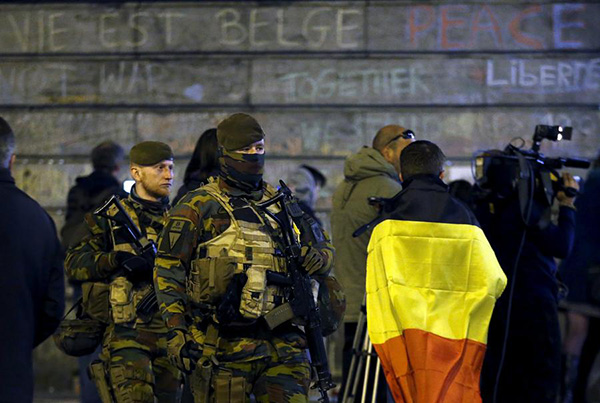 |
|
Belgian soldiers patrol as people pay tribute to the victims of Tuesday's bomb attacks at the Place de la Bourse in Brussels, Belgium, March 26, 2016. [Photo/Agencies] |
When I got out of a taxi and rolled my suitcase into Brussels-South station to get a train to London on Thursday evening, two heavily-armed soldiers patrolling the concourse stared at me up and down, with their hands holding their guns against their chests.
Because of the March 22 terror attacks in Brussels, I thought I would have to pass through security checks of my luggage before entering the gate of the station. But I found this was not the case.
The check-in and border control procedures were the same as my previous trips from Brussels to London. The only obvious difference was that soldiers and security guards were more evident in the arrival and departure halls. And they were fully alert.
Three weeks after terrorists attacked Brussels' airport and a subway station, life and business activities in this European capital have gradually returned to normal. The damaged airport partly reopened a few days ago, though my last trip between Brussels and Prague four days after the attacks was via Amsterdam.
Security checks of luggage before entering the departure halls has only been implemented in Brussels' airport since its reopening but it is still unknown whether this is temporary or not. And people can enter other metro stations, train stations and shopping malls freely without passing through any security check.
Brussels lowered its security alert only three days after the bloody blasts, which claimed 32 people, including one Chinese, though well-armed soldiers and police can be seen patrolling throughout the center of Brussels.
Calling it the worst attack on the country's soil since World War II, Belgian authorities should well know how serious and challenging the situation is. Like the French, the Belgians have learned a costly lesson.
It is daunting that nearly all of the embassies in Brussels and Paris have warned the tourists and investors from their countries of being cautious in making decisions to visit France and Belgium.
Some Chinese researchers have begun to do research on how the security situation in Europe will affect the bilateral business activities. Their preliminary figures may offer some relief. During the first three months this year, the number of Chinese tourists in France dropped by 7 percent year-on-year due to the attacks in Paris. However, China's investment in France has still shown steady increase.
Very likely, it is the same with Belgium: more tourists will cancel their trips but business activities will not be affected too much.
Within one week of the Brussels attacks, a Chinese businessman told me that he still plans to buy a big office property in downtown Brussels. He forecasts that the price will drop by 10 to 20 percent on average in Brussels in the coming months. A Chinese businesswoman I spoke with is seeking to invest in a Belgian brewery. While one long-time Chinese investor in Brussels planned to organize an investment seminar to indicate his confidence in Belgium. I believe there are many more due to Belgium's geographic and geopolitical attractions.
Reassuring them is an urgent task for Belgian Prime Minister Charles Michel.
Michel cancelled his scheduled trip to China because the attacks happened just one day before he was due to fly. Of course, it is rational for him to make his trip once the situation in his country is under control. This time, his mission will be convincing Chinese investors and tourists that similar attacks will not happen again.
The onus for that is not just on Belgium, the European Union must clean house and ensure people's safety if they are to help attract tourists and investment.
The Belgian and European authorities must convince the world that the EU countries are safe.
The author is deputy editor of China Daily European Edition. fujing@chinadaily.com.cn

I’ve lived in China for quite a considerable time including my graduate school years, travelled and worked in a few cities and still choose my destination taking into consideration the density of smog or PM2.5 particulate matter in the region.